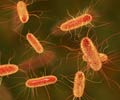Researchers describe an association between necrotizing enterocolitis and a subset of E. coli bacteria, called uropathogenic E. coli, that colonize the infant gut.

‘Bacteria start to colonize infants as soon as they are born, but preterm infants colonize and react to colonization differently than term infants.’





"Bacteria start to colonize infants as soon as they are born, but preterm infants colonize and react to colonization differently than term infants. What we found is that when preterm infants are colonized by uropathogenic subtypes of E. coli, they are much more likely to develop necrotizing enterocolitis," said co-first author Doyle Ward, PhD, associate professor of microbiology & physiological systems at UMass Medical School and director of operations for the UMass Medical School Center for Microbiome Research. Uropathogenic E. coli, or UPEC-typically the cause of urinary tract infections-is frequently found in the gut of infants and adults. But according to the new study, when UPEC colonize the gut of extremely premature infants, those infants have a higher risk of developing necrotizing enterocolitis (NEC).
"This is a challenging and complicated disease, and I think that any new information that offers an opportunity to save an infant's life is an important advance," Dr. Ward said. "We have identified a type of pathogen that preterm infants may be uniquely vulnerable to."
The researchers collaborated with hospitals in Cincinnati and Birmingham, Ala., to obtain stool samples from a cohort of 166 infants: 144 pre-term and 22 that had been carried to term. The team sequenced the infants' stool and developed metagenomic analysis tools to identify the bacteria colonizing each infant. Previous work had already identified Enterobacteriaceae-a family of bacteria that includes E. coli-as potentially associated with NEC, but Ward and his colleagues used new analysis tools to distinguish the different types of E. coli in the infants.
The team singled out UPEC as the E. coli type most strongly linked to infants who developed NEC. In the study cohort, 27 of the infants developed NEC, all pre-term. The disease was fatal in 15 of those cases. UPEC was found in 44 percent of the infants who developed NEC, compared to only 16 percent of the 111 infants who survived without developing NEC.
Advertisement
Although the team didn't address the question of where UPEC in an infant's gut might originate, they did observe an association between vaginal delivery and death from NEC in these extremely pre-term infants. "Many infants do have UPEC in their gut," Ward said. "It may be that they're colonized when they pass through the birth canal, and this could be a source of risk. We just don't know yet."
Advertisement
"The take-home message is that if we can identify these potentially harmful organisms early enough in a pre-term infant, and learn about them in advance, we can arm physicians with information that could help them make care decisions for these vulnerable infants," he said.
Source-Newswise












